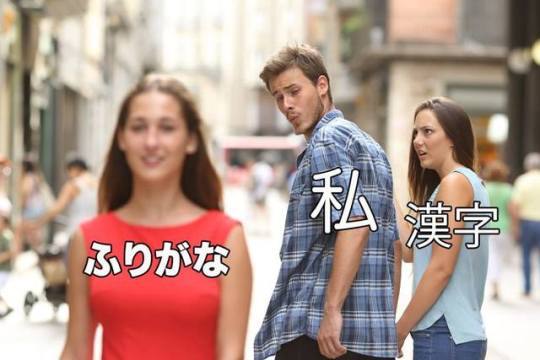Just a diary so I can keep track of my studies and don't get lost... hope you enjoy your stay here...
Don't wanna be here? Send us removal request.
Text
Kanji 私!
17/01 A very useful kanji!
Drawing -

(A 7 steps kanji so we can look it up at the dictionary...) Sounds 私 - SHI watakushi/ watashi Meaning 私 - I, Me, Private
4 notes
·
View notes
Text
今日は火曜日です!
16/01 “Today is Tuesday!” Using the Kanji that we have already seen in earlier posts we can see the phrase being formed: “今日 は 火曜日~です!” “Kyoo wa Kayoobi~desu!” (Some words have a special reading... like Kyoo for exemple... the sound its not the same as the one we saw at the dictionary...)
0 notes
Text
Kanji 火!
16/01 Today is tuesday so let’s see what the kanji used on this day means... Kanji 火: Drawing -

(Only 4 steps kanji! So let’s just check out what it means!) Sound 火 - KA hi/ -bi/ ho- Meaning 火 - Fire (If you pay attention you can see that the kanji looks like a bonfire!)
0 notes
Text
Kanji 今!
16/01 Drawing -

(Just like in the mangabites post... And just like “ 日” it’s a 4 steps Kanji....) Sounds 今 - KON/ KIN ima Meaning 今 - Now
0 notes
Text
曜日! (Weekdays!)
15/01 So... since today it’s monday I thought it would be a good idea to learn the days of the week and see how the names are formed:

As we can at the image all of them end with “曜日” meaning it’s a day of the week. Kanji 曜: Drawing-

(As we can see this kanji is a little more complex and have 18 steps, so to find it in the dictionary we go look for it at the 18 steps kanji’ part…)
Sounds 曜 - YOO Meanings 曜 - Day of the week, weekday 曜日! - So the kanji weekday + the kanji for day show us that the name is for a day of the week. (Together the kanji “日” will be an ending with se sound of “bi” turning into: Yoobi “ようび ”)
0 notes
Text
Kanji 日!
15/01 Kanji 日: Drawing -

(A basic kanji with only 4 steps... but its very useful and it’s even in the name of the country! ”日本”) Sounds 日- NICHI/ SHITSU hi/ -bi/ -ka Meanings 日- day, sun, japan
0 notes
Text
Memrise
As for the weekends I am actually using the site Memrise to review the kanjis... It has been very helpful!
0 notes
Note
Como se escreve e em que situação se diz "arigato" ? Aportuguesado ...rs
“Arigato” é um agradecimento assim como “Obrigado”, podendo estar sendo comumente usado em sua forma de hiragana(ありがとう) ou no kanji(有難う).
0 notes
Photo
A sentence that will be good to remember the formation and some new kanjis for us to study: 今 / 日 / 暑

今日も暑いな
12 notes
·
View notes
Text
行こう!(Let’s go!)
11/01/2018 Ikō! or Ikoo! Starting today I have the intention to post everyday at least a few kanjis or maybe words even in Furigana(Hiragana/Katakana) so we can keep reminding ourselves the meanings/sounds of them and at the same time in this post let’s see the meaning of the sentence “Ikō!“. The most important now is the radical “行“: Drawing-

(As we can see, the kanji have 6 steps, so to find it in the dictionary we go look for it at the 6 steps kanji’ part...) Sounds 行 - KOO/ GYOO/ AN i(ku)/ yu(ku)/ -yu(ki)/ -yuki/ -i(ki)/ -iki/ okona(u)/ oko(nau) Meanings 行 - Go / Travel 行こう! - So Ikō! has the verb “go” as the radical, with “こう“ as the ending of the conjugation giving the sentece the context of an intransitive verb... with this we can conclude that the meaning is something like: “Let’s go”
1 note
·
View note
Text
How to use the Dictionary
Just as I said at the first post, I’ll be using a dictionary(that is in portuguese) as reference. Question: “But how can I find a kanji in a dictionary if they don’t use an alphabetical order?”. Answer: “Japanese it’s a very funny language... The drawing of the word is very important... so the dictionary uses how many times you have to put your pen on the paper to draw the Kanji, that’s why it’s very important to know how to draw hiragana and katakana first, because when you learn how to draw them you will get used on how to draw the Kanji in a easier way...”
0 notes
Photo
Hiragana/Katakana are very important but don’t let them attract you too much… Kanji is our focus here…

20K notes
·
View notes
Text
Hiragana/Katakana
Hiragana/Katakana are very important to understand the way that the sounds are formed in japanese and it’s essential for keeping track with the Kanji, if you don’t have the knowledge you can see them and try to learn here:
Hiragana - Syllables normally used to express the sounds of words from japanese origins.

Katakana - Syllables normally used to express the sounds of words from foreign origins.

5 notes
·
View notes
Text
Dictionary
Hello, my first post here just to inform that I’ll be using this dictionary sometimes: https://skdesu.com/wp-content/uploads/2015/04/dicion%C3%A1rio-de-kanji.pdf PS: It’s in portuguese since I am from Brazil…
0 notes